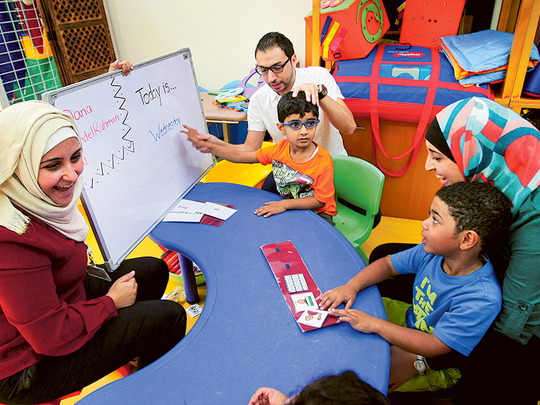
Dubai: While many parents celebrate their baby’s milestones every month, for the Al Ghafry household every day is a celebration for baby Mohammad.
Mohammad, a nine-month-old baby with Down syndrome, has been progressing well for the past five months through the help of the Dubai Early Childhood Development Centre under the Community Development Authority (CDA).
“We have so many targets for Mohammad, so we do celebrate every day Alhamdulillah because I see an improvement every day,” Nasser Al Ghafry, Mohammad’s father, told Gulf News.
“Now he can turn over. He recognises me and his mum. When you take a toy from him, he’ll start crying so he recognises that it’s a toy and it’s his. We have organised his sleeping pattern. Now, he’s in the stage before he can crawl and we can see that he’s putting an effort.”
Mohammad is just one of the 70 Emirati kids currently enrolled at the centre in Al Manara that was officially inaugurated by Shaikh Mansour Bin Mohammad Bin Rashid Al Maktoum, Chairman of the Supreme Committee to Protect the Rights of People with Disabilities, on Wednesday.
The centre caters to all cases of disabilities among Emiratis, from newborn to those six years of age. The services are free so long as the parents are enrolled in the centre.
“We do not take a child alone in the centre. The child is not delivered to us and the parents walk away. The parent for us is part of the rehabilitation programme,” Khalid Al Kamda, Director-General of CDA, told reporters.
Al Kamda said the parents are part of the programme so that they can learn what the kids learn and implement it at home. Parents are also given one on one sessions with psychologists to help them as rearing children with disabilities can be very challenging.
But the sessions are not limited to the centre.
“Here we work as a team with the child and his family. We work with them in the centre, in their natural environment, hence in the house and the school,” Dr Shaikha Alia Humaid Al Qasimi, Director of Social Programme and Inclusion, told Gulf News.
“The difference in this model is we work very closely with the family and they are a key stakeholder in the whole intervention plan and even in setting the goals for their children. The social model helps empower these parents in the way they deal with their children,” she added.
Shaikha Alia emphasised that early detection and early rehabilitation of people with disabilities will better impact the children’s lives. This way they can be enrolled into a programme that will address all their needs, be it speech, physical and motor therapy, or behavioural therapy.
Shaikha Alia said by the time the children reach six, they can be enrolled in mainstream schools like their former clients Meera and Nasser, who have been “awarded excellence awards in their schools by the Minister of Education, which shows you that their capabilities are equal as those without disability”.








